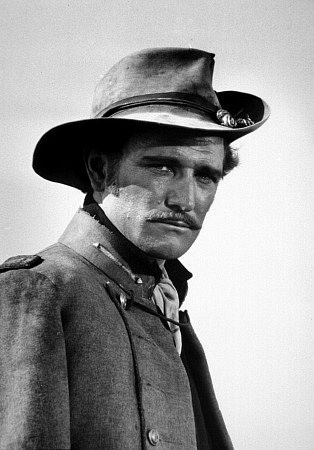|
Richard Harris
Scroll down for movie list.
Biography from Leonard Maltin's Movie Encyclopedia:
This feisty Irishman, a tall, slender, fair-haired performer with thin, bony face and piercing blue eyes, became an unlikely star after stunning movie watchers with a high-octane performance in This Sporting Life (1963). For his interpretation of the bitter young coal miner who becomes a professional rugby star, Harris earned an Oscar nomination and leapfrogged to the top of the international cinema's A list of leading men. A graduate of the London Academy of Music and Dramatic Art, he spent several years on the stage in Britain before making his movie debut in Alive and Kicking (1958). He quickly earned a reputation as an interesting performer, a rep borne out by his skillful supporting turns in Shake Hands With the Devil, The Wreck of the Mary Deare (both 1959), The Guns of Navarone, Jungle Fighters (both 1961), and Mutiny on the Bounty (1962).
Following his star-making stint in This Sporting Life Harris appeared in Red Desert (1964), Major Dundee, The Heroes of Telemark (both 1965), The Bible (as Cain), Hawaii (both 1966), and Caprice (1967) before starring as King Arthur in the disappointing screen adaptation of Camelot (also 1967). (He later played the part in stage revivals of this Lerner and Loewe musical, and despite his limitations as a singer, even had a hit record with "MacArthur Park.") A secondary lead in The Molly Maguires and a starring role in the turgid historical saga Cromwell (both 1970) seemed to indicate Harris' film career was headed for the dumper.
But along came A Man Called Horse (also 1970), a modestly budgeted Western that starred him as an English aristocrat captured and tortured by Sioux Indians. Genuinely suspenseful if tastelessly gory (by standards of the day), it nonetheless became a surprise hit and boosted Harris' stock once again. He did two sequels, The Return of a Man Called Horse (1976) and Triumphs of a Man Called Horse (1983), neither of which enjoyed the original's success. Harris' pivotal year, 1970, also saw the actor turning his attentions behind the camera: He cowrote the screenplay for The Lady in the Car With Glasses and a Gun (in which he did not appear) and directed as well as starred in The Hero (released 1972), playing an aging soccer star.
Harris, a notorious wild man offscreen, enjoyed the high life throughout the 1970s, even though most of his films during that decade didn't offer cause to celebrate: Man in the Wilderness (1971), The Deadly Trackers (1973), 99 and % Dead, Juggernaut (both 1974), Echoes of a Summer (1976), The Cassandra Crossing, Gulliver's Travels, Orca, Golden Rendezvous (all 1977), The Wild Geese (1978), Game for Vultures, Ravagers and Your Ticket Is No Longer Valid (1979). He has worked sporadically since then, but increasingly in eccentric character roles: Tarzan, the Ape Man (1981, as Bo Derek's father), Martin's Day (1984), and Mack the Knife (1989). In 1990 he made a dramatic comeback with his commanding performance in The Field a dour Irish story that earned him a Best Actor Oscar nomination and made him a latter-day media darling. He followed this up with meaty character parts in Patriot Games (1992, as an Irish rebel leader), Unforgiven (also 1992, as a dandified gunslinger), Wrestling Ernest Hemingway (1993), and Sam Shepard's Silent Tongue (1994). |  |










